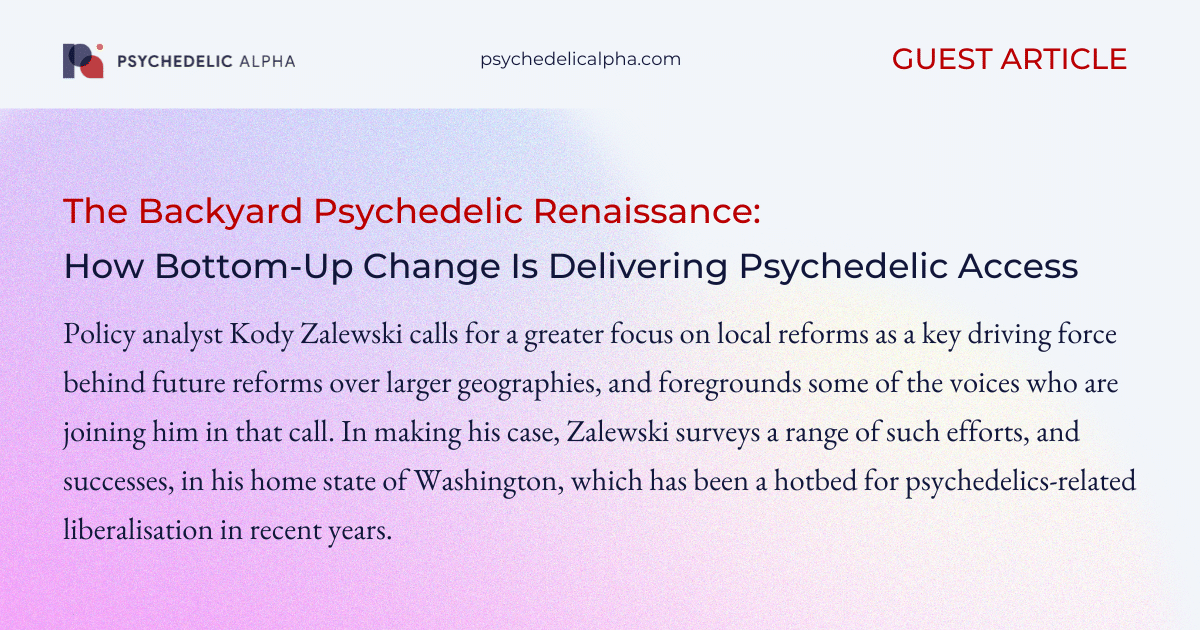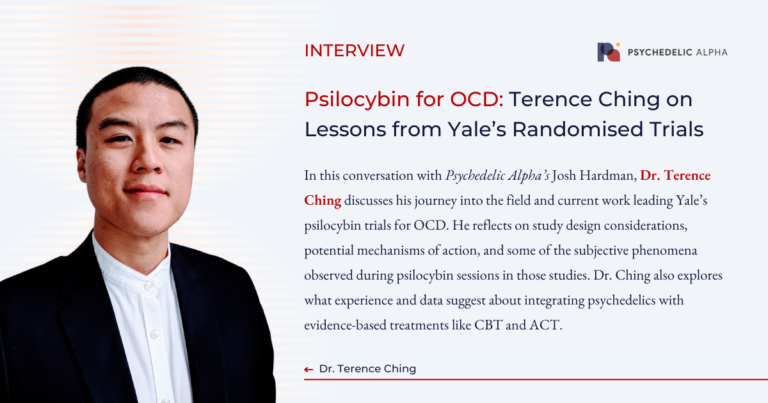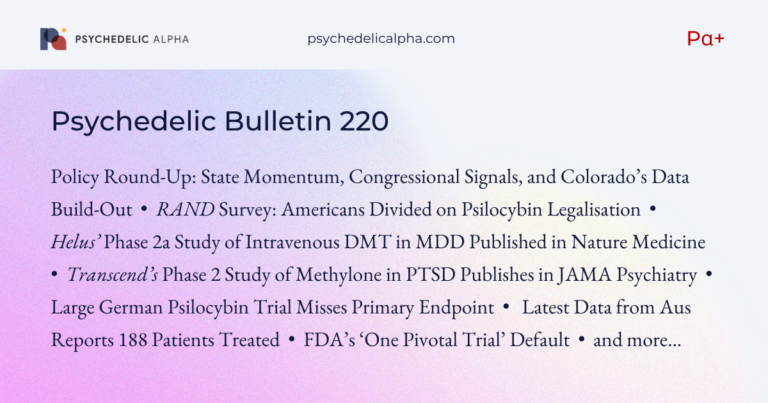When it comes to psychedelic policy reform efforts, much of the public and field’s attention has focused on state-level initiatives or the potential for federal reforms. Indeed, here at Psychedelic Alpha we have dedicated tens of thousands of words to covering such efforts in the 2025 session alone!
But in this Guest Article, policy analyst Kody Zalewski calls for a greater focus on local reforms as a key driving force behind future reforms over larger geographies, and foregrounds some of the voices who are joining him in that call. Here, he urges activists to embrace the Matryoshka doll of U.S. lawmaking, warts and all, with a focus on making change happen at the city or county level. In making his case, Zalewski surveys a range of such efforts, and successes, in his home state of Washington, which has been a hotbed for psychedelics-related liberalisation in recent years.
In tracing the movement’s evolution—from early decriminalisation efforts and zoning tussles, to debates over commercialisation and cultural preservation—this piece conveys Zalewski’s central conviction: that substantive progress on psychedelic decriminalisation and access need not come from the Capitol, but from communities choosing to challenge the status quo, one municipality at a time.
A guest article by Kody Zalewski.
The glacial movement of the US federal government is no secret. The DEA hasn’t demonstrated urgency in addressing the rapidly-growing body of evidence suggesting that illegal psychedelics have profound therapeutic properties, and while Congress does possess the authority to regulate controlled substances, the 118th Congress was one of the least productive in history.
While it may come as a surprise to some, recent events across the country have shown that civic engagement with municipal government is the most accessible, and arguably effective, form of political action available to those hoping to expand access to psychedelics.
State ballot initiatives in Oregon, Colorado, and Massachusetts represent the tip of the spear with regard to large-scale legislation, and these efforts have drawn attention to wider access and institutional normalization of psychedelics. These “laboratories of democracy” created ample room to experiment with legal frameworks for psychedelics, but activism at the granular levels of city and county ended up representing an overlooked but critical battleground for political change.
It was just such civic action which conclusively demonstrated the political viability of psychedelic access in May 2019, following the passage of Denver’s Ordinance 301 ballot initiative by a narrow 50.6%-49.4% majority vote. As of February 2025, nearly three dozen local governments across eight states have either passed or introduced measures to scale back prosecution related to possession of controlled psychedelics.
Nesting dolls of laws: Navigating federal and state psychedelic prohibition
Approaching decriminalization this way is effective, but complicated: passing municipal laws decriminalizing psychedelics creates a legal conflict where federal laws take precedence over state law and state law takes precedence over local law.
The federal Controlled Substances Act of 1970 designated most psychedelics as “Schedule I”, or a substance with a high risk of abuse, no medical value, and no safe use. Penalties vary, but even simple possession of a Schedule I drug carries a minimum $1,000 fine and up to 1 year in prison on the first offense. Every state has passed a version of the Controlled Substances Act, differing in terms of fines and the lengths of sentences.
Additionally, legal risks remain for those advocating on behalf of psychedelic access, even absent any use or possession and despite strong protections for freedom of speech. Although never tested in court, some advocates are concerned that flouting federal laws could theoretically be construed as a “conspiracy to distribute controlled substances”, with penalties equivalent to felony trafficking.
Local governments are typically empowered to levy civil penalties and manage land use, traffic, schools, and public employment, but they lack the ability to redefine felonies. This telescoping governance philosophy of larger domains trumping smaller ones is known as preemption, and at first glance, it makes petitioning local cities and counties to reform drug laws seem like a dead end.
However, history shows that local activism in reforming drug laws isn’t as backwards or idealistic as it first appears. The 1997 Supreme Court ruling in Printz vs. United States dictates there is no mandate for local law enforcement to act on federal legal violations, which creates a pivotal loophole for advocates. Federal enforcement fundamentally relies on individual officer discretion while those same officers remain under a municipal directive against that enforcement.
The barriers posed by federal law and preemption aren’t unfamiliar, and cannabis advocates have already proven that the bottom-up approach can be an effective driver of change. Cannabis and psychedelics are both designated Schedule I, despite marked pharmacological differences. While the modern fight to decriminalize psychedelics may be more recent, its trajectory could parallel that taken by cannabis, starting with municipal decriminalization efforts that ultimately build a platform for larger changes.
Over 120 municipalities and counties have decriminalized cannabis, even in states like Kansas where it remains fully illegal. This grassroots cannabis activism began soon after its prohibition: Ann Arbor, MI decriminalized cannabis in 1972 following the jailing of Detroit activist John Sinclair after selling two joints to undercover law enforcement. Today, recreational cannabis is legally available in half of US states, the result of 50 years of community education, activism, and outreach. And yet, the DEA continues to delay rescheduling to Schedule III, ensuring the debate continues.
Of course, federal or state officials may still pursue charges, but these agencies generally pursue a “supply reduction” strategy, prioritizing international trafficking targets and illicit large-scale industrial production by organized crime. Only 1.4% of the 10,542 drug cases filed by federal attorneys in 2013 were for drug possession. In 2012, municipal and state law enforcement arrested 1,328,457 suspects for violation of controlled substance laws, compared to 30,476 arrests by the DEA. It is clear that when it comes to everyday citizens, the burden of enforcing controlled substance possession sits squarely on the shoulders of America’s local law enforcement agencies.
Of course, local regulation doesn’t exclusively exist to broaden access to psychedelics either; it also can be wielded against them.
In 2022, Synthesis, an established Dutch psilocybin retreat and training operator, sought transatlantic expansion following Oregon’s passage of Measure 109. Synthesis eagerly bought a $3.4 million 124-acre property for a psilocybin retreat near Buckhorn Springs in Jackson County. However, unlike Colorado, Oregon’s psilocybin services program didn’t preempt cities and counties from restricting service centers in their community. A concerted effort to ban service centers from Jackson County narrowly failed, possibly due to their lobbying efforts. Despite the initial success, the center still needed approval from the commissioners of the Land Development Ordinance (LDO). The LDO, which has powers over land use and zoning regulations, made the decision to only allow psilocybin service centers in areas zoned for commercial use. This decision rendered their $3.4 million dollar facility a financial boondoggle. After spending $200,000 in lobbying against the Jackson County initiative, its combined liabilities totalled $850,000. Synthesis, once viewed as the foremost leader in psilocybin training and service centers prior to entering in the US market, filed for bankruptcy in March 2023.
Drawing lines in the sand: Natural psychedelic exceptionalism and the theory of change
Local legislation has focused primarily on four natural psychedelics: psilocybin, ibogaine, ayahuasca, and mescaline. These are commonly described as “entheogenic” drugs, those that often elicit spiritual experiences following consumption.
Decriminalizing these psychedelics can be legally complex: for example, ayahuasca is typically a brew of several different plants, and psilocybin is not the only psychoactive compound found in the mushrooms which produce it, and these wrinkles make clear legislation challenging to pose and pass. Synthetic psychedelics like these are perceived to possess enough of a stigma that, apart from a Berkeley-area proposal to decriminalize LSD, no efforts to decriminalize these drugs have made significant headway at the municipal level.
Recent initiatives have reframed the language to avoid inadvertent omissions, adding language encompassing all “currently scheduled or analog psychoactive indolamines, tryptamines, or phenethylamines”. Polling data on the relative social acceptance of different psychedelics is virtually nonexistent, but activists suggest the wider public is more comfortable with natural psychedelics than with pharmacologically similar, yet synthetic, counterparts, such as LSD or MDMA.
This perspective is acknowledged by Tatiana Quintana-Luz, co-director of the Psychedelic Medicine Alliance of Washington. An activist, she was deeply involved in bringing decriminalization to Seattle and continues working to promote statewide decriminalization as a board member of REACH WA. In her words, “The whole natural plant or fungi based medicine seems safer – although the harm reductionist in me knows that this is just a perception. With any substance you put in your body, one would be best served by being informed.”
Why does local decriminalization of these natural psychedelics matter for organizers and activists? Quintana-Luz says, “This matters at all levels because it will take a coordinated effort from the local level all up the chain to integrate these natural medicines and destigmatize them.”
Cole Schrim previously worked for the State of Washington as a therapist and has led the Tacoma Psychedelic Society for almost two years. Schrim says these goals of local access and decriminalization are important “[for] allowing people to grow a plant and consume it according to their own judgment and needs.”
“Maria Sabina and other indigenous protectors of psychedelic plants and fungi were in relationship with plants and fungi, holding them sacred”, she continued, contrasting: “Governments only see psychedelic plants and fungi as a problem to solve in terms of bureaucracy, capitalism, regulation.”
For her, broadening access at the local level is a means to preserve healing traditions and broaden access beyond commercial boundaries.
Commercial sales are beyond the pale… or are they? Are grassroots efforts a window into the future of psychedelic access?
At this time, no local legislation has created a legal framework for the sale of personal-use amounts of psychedelics, in a departure from the model pursued by cannabis activists. Psilocybin services models allowing for supervised consumption have been created in Oregon and Colorado, but open sale of psychedelics has yet to become a goal of any politically effective local activist group.
A major driver of this is that commercial distribution of psychedelics requires kinds of regulation perceived to be outside the scope of municipalities, regulation which necessarily intersects with existing legislation on taxation, agriculture, and safety. While non-enforcement of preempted laws is one thing, creating new suites of conflicting laws is seen by many local authorities as unviable. However, if you look closely, signs of life are emerging which suggest an appetite for a recreational psychedelic market, and local efforts may take credit.
Oregon law only permits supervised consumption of psilocybin, but Shroom House opened in Portland, OR, operating openly as a recreational-use psilocybin storefront. It was shuttered by law enforcement the following year, however its website remains active and appears to be accepting orders. Some providers believe creating access to the healing properties of psilocybin is more important than generating revenue, and are willing to provide it freely, or operate purely on donations.
However, Portland is far from the only place where an appetite for commercial use exists: Vancouver (British Columbia) may represent a window into the future of American psychedelic acceptance. Vancouver’s notoriously lax drug enforcement in the 00’s led to early adoption of retail cannabis, and a similar situation is playing out today with regard to psilocybin. The city presently chooses not to prosecute at least eight magic mushroom storefronts, though other Canadian cities such as Winnipeg and Toronto have been less tolerant of similar ventures.
Such fears may stem from anxieties that commercial psychedelics might reveal a demand that parallels that for alcohol or cannabis, but this assumption is likely a mistake. Unlike cannabis or alcohol, data on rates of persistent use or abuse of deprioritized natural psychedelics is absent from medical literature and it could map much more closely to less-profitable psychoactive medicines like the $2.1 billion-dollar US kratom industry (compared to the 20-fold larger US cannabis industry). In comparison to its eight psilocybin storefronts, Vancouver city-proper has 23 to 27 cannabis dispensaries and hundreds, if not thousands, of vendors serving alcohol as of February 2025.
“Get it right the first time”: The holistic methodology of community healing
While it’s clear that there is sufficient demand to support some level of commercial sale, not all activists agree that it’s the right way forward. Erin Reading leads the Port Townsend Psychedelic Society and is a graduate of the University of Washington and California Institute of Integral Studies. She has made her home in a yurt on the rain-soaked Olympic Peninsula and describes running the non-profit society as her “full-time unpaid job”.
Reading has mixed feelings on the potential for sales in her community: wary of both commercial storefronts and medical access models, she believes psychedelic access should unfold at a cautious pace.
”I don’t like the idea of things being sold, I don’t want to see these medicines be commercialized”, she said, adding: “[I] would rather not see things advertised on social media, or on websites, at least something not being pushed on to people.”
Despite hesitancy toward mass-commercialization, sales through trusted sources and community-building is important to her vision: “We want to protect growers. They deserve to make a livelihood and be protected. […] We want there to be farmer’s market-style mushroom selling.” This extremely locally-focused access clashes with market-oriented approaches, sometimes forgoing sales entirely.
Indeed, municipal legislation throughout the country has highlighted a non-commercial ‘Gift, Gather, Grow’ access model. As suggested by the name, this allows for any access to wild or cultivated natural psychedelics without legal interference. This community access model is incongruent with FDA drug approval, and incompatible with state-level legislative efforts to copy Oregon’s psilocybin service laws.
Reading highlights the importance of integrating community trust and rapport into psychedelic access. Her psychedelic society got its start providing group sessions helping members integrate psychedelic experiences, and her perspective is that their model provides a more holistic and successful treatment regimen than treating natural psychedelics as a commodity. “…having the community support and education to go along with [psychedelic experiences], that’s why we started the psychedelic society to go along with that, not just doing decriminalization. It’s the education, the support, the training”, she said.
Reading believes in different means of access, but remains skeptical toward the success of psychedelics as a mental health treatment in the absence of community and peer support. For this reason, Reading is adamantly against any future legislation without decriminalization: the ‘Gift, Gather, Grow’ model isn’t possible without it.
Reading has been outspoken in her opposition to proposed statewide legislation, seeing parallels to the commercialization of cannabis over a decade prior. Many states have legalized growing cannabis at one’s own home, but Reading believes commercialization has created a market to lobby against any legal reforms to this law. An Oregon-style service center model may exclude decriminalized community healing while creating a lobby to actively oppose it.
In her opinion, she wants to “get it right the first time” to legally allow one-on-one connections in the local community where the most profound benefits occur.
Decriminalization: A solution in search of a problem?
Washington State’s reputation as a progressive bastion makes it a hotbed for local activists working to push for decriminalization of psychedelics at the municipal and county level. In the past four years, Seattle, Port Townsend, Jefferson County, and Olympia have all decriminalized psychedelics, recently joined by Tacoma in January 2025. These successes may be attributable in part to the fact that they didn’t represent major changes to the way enforcement was already occurring in those legislative domains.
Clear numbers on controlled substance possession arrests are hard to obtain. Nonetheless, according to King County, home of Seattle and the largest county in Washington state, prosecution associated with natural psychedelics is rare. In 2023, the King County (population: 2.3 million) Prosecutor’s Office stated they can “only recall fewer than perhaps 5 cases received in the past 5 years related to entheogens”.
Indeed, prosecution of simple possession cases is unusual when it comes to psychedelics broadly, but enforcement actions do occur. Reading describes how an initially fruitless push for decriminalization was catalyzed by an arrest in Port Townsend several years ago. Following a routine stop of a local resident, a police officer spotted a bag of mushrooms falling out of the resident’s purse while retrieving their license. The resident admitted the bag contained psychedelic mushrooms. According to Reading: “The police officer first calls support and the sheriff’s department shows up. They have this conversation about mushrooms where the police officer asks, ‘What are mushrooms?’ Reading notes that understanding of natural psychedelics can vary widely among law enforcement, sometimes with negative legal repercussions for citizens using them. “He looks it up on the DEA website, sees: ‘Schedule I, high potential for abuse’, and is basically like ‘I’m justified in arresting this person, the DEA website says it’s highly addictive.’”
Due to Washington law at the time, the person was eventually able to have the charges dropped after pleading guilty to a felony. Although the number of people experiencing legal consequences for possessing psilocybin may be lower than other psychoactives, the need to change laws is still important to many across the state.
Cohesion and conflict: Bridging barriers and connecting cultures
Legal change doesn’t just happen in deep blue areas around Puget Sound. Other regions of Washington State with markedly different political and cultural climates are also making progress on acceptance.
Take Spokane, the second most populous city in the state, which sits in the arid Columbia Basin on the far eastern border with Idaho, a region known for its strong conservative streak. Jenny Hansen is leader of Enlighten Spokane and the Spokane Area Psychedelic Society in addition to extensive volunteering with Heroic Hearts, an organization promoting veterans’ psychedelic access.
Hansen acknowledges the differences between her city and more liberal bastions that have achieved decriminalization, however she describes the members of her coalition and the city of Spokane itself as “purple”.
“We promote SAPS [Spokane Area Psychedelic Society] in our local community because we know many folks (regardless of their political ideals) need healing. It’s not about left vs. right, rather, it’s about fellow humans supporting one another as we navigate the challenges of life.” She isn’t alone; the resolution attracted robust support, including from a Republican city councilmember, and has yet to result in negative feedback or attention for their organization.
Grassroots activism has mobilized many demographics, and invites those who are most passionate about the issue to rise to key leadership roles, and it is interesting to note that virtually every local Washington State organization pushing for decriminalization is led, sometimes in part but more often in whole, by women.
Reading describes styles of engagement from women that are rooted in community and egalitarianism, as opposed to top-down communication from those with higher social status like medical professionals. “There’s a tendency to be relationship-based, and have knowledge not held above or [in] any hierarchies, but openly shared, to see the wisdom in each and every person […] there’s relational support in tending and caring for each other. Maybe even a fierce protection for our right to care for each other.”
These sentiments are echoed by Schrim: “I feel that women or femme-presenting people often have a higher capacity to build connections due to their learned and innate ability to understand complexity within personality dynamics. Skillful implementation of interpersonal nuance by way of emotional intelligence is integral to good community organizing.”
While women appear to be well-represented in the movement, across the country, most cities which have decriminalized natural psychedelics are demographically homogeneous. Detroit, Washington DC, Oakland and San Francisco are the only minority-majority cities which have undertaken successful decriminalization efforts. Apart from these, the other 26 states, cities, and counties which have shown the greatest appetite for decriminalization are often both white and highly-educated. This seems borne out in public opinion despite calls for increased diversity in psychedelic spaces. A 2023 UC-Berkeley poll has shown young, white, highly-educated males have the greatest familiarity with psychedelics.
Demographic clashes in grassroots activism, typically those grounded in differing beliefs about the spiritual and cultural contexts of psychedelic source cultivation and distribution, have occasionally resulted in controversy. Notably, schisms occurred when activists sought to remove penalties for possession of the peyote cacti, sacred to indigenous tribes in the Southwest US.
The Native American Church (NAC) argues that the removal of these penalties promotes the poaching of an already limited and slow-growing sacred resource, and their attendant policy position is that deprioritization of the active ingredient mescaline should be confined to more plentiful sources such as the San Pedro cacti.
David Bronner, CEO of Dr. Bronner’s soap company and key legalization philanthropist, has “asked the psychedelic movement to follow [the NAC’s] lead on conservation of peyote medicine on this continent, and not decriminalize their medicine at the state or city level.”
This has caused a rift with other activist groups like Decriminalize Nature. The website of Decriminalize Nature states: “Decriminalization of Peyote for personal cultivation for non-Indigenous should occur immediately to reduce the demand for the cacti that are extracted from Indigenous sources and habitats for the peyote trade. Be it Further Resolved that Peyote in its natural habitat should be available only for Indigenous communities and poaching should continue to be penalized.”
“Mountains are high and the emperor is far away.”
Changing local laws might be the first step in seeing state, and ultimately federal, change. This fight is clearly neither short nor easy, and the process extends beyond merely changing municipal ordinances. It involves empowering the average member of society to play a direct role in increasing access to natural psychedelics by contributing to a process of community education. These face-to-face conversations with average people are far removed from the popular perception of political change, often imagined to be driven by Washington DC lobbyists meeting in smoke-filled rooms.
There is a Chinese proverb dating back to the Yuan dynasty which characterizes the power of local actions when “the mountains are high and the emperor is far away”. Thousands of miles from the capitol, in the northwestern corner of the United States, the mountains are high indeed, and shifting attitudes on psychedelic medicine continue to steadily diverge from those of traditional American institutions.
Kody Zalewski is a policy and data analyst exploring the intersection of health, science, and law. He is co-director for the Psychedelic Medicine Alliance of Washington and lives in Seattle.





